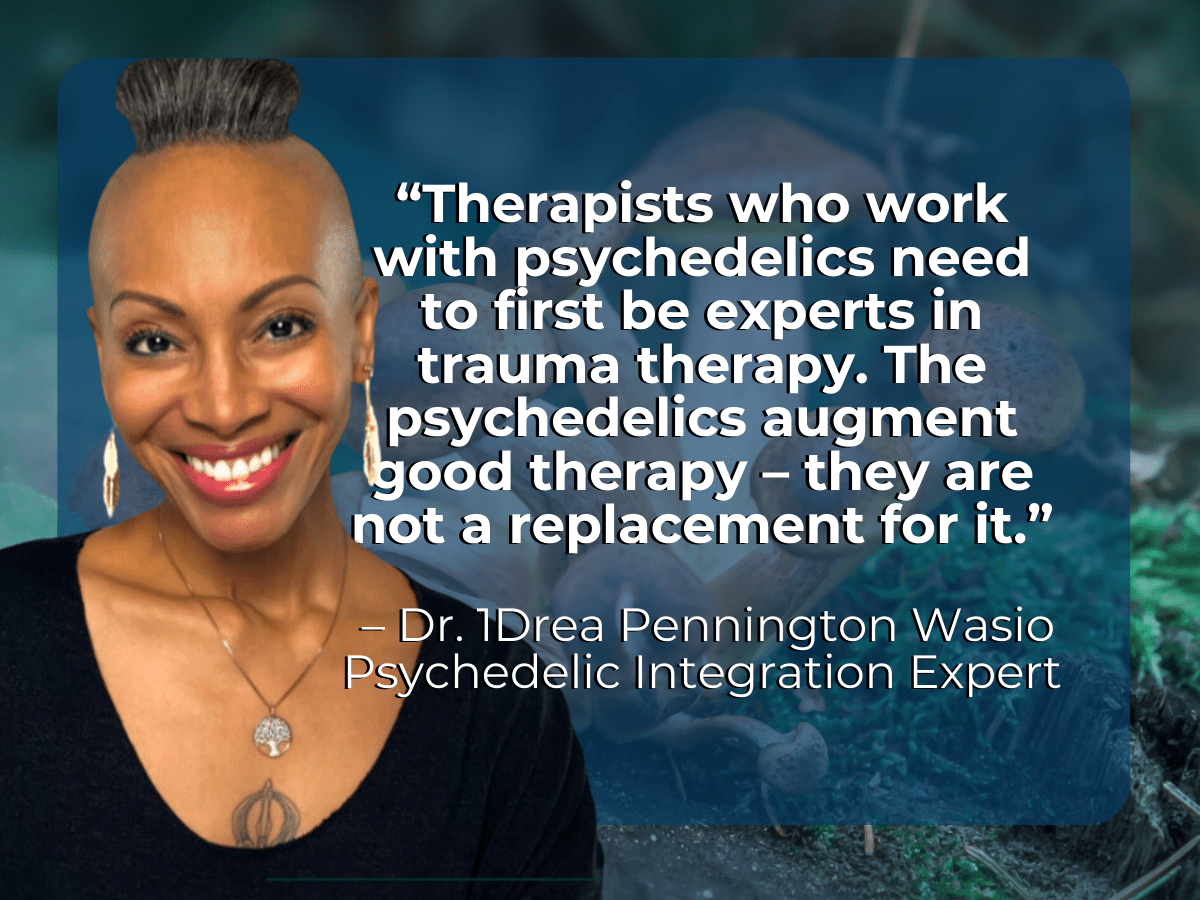Psychotherapists hold a crucial position in tackling the intricate challenges that stem from implicit bias and racial trauma in psychotherapy and within today’s multifaceted society. The emphasis becomes particularly significant when engaging with BIPOC persons in therapeutic settings, necessitating that we confront and navigate our own biases.
—
Dr. Shelly Harrell on Racism in Psychotherapy and the Role of Mindfulness
Context and Consequences of Racism in Therapy
One of the aspects Dr. Shelly Harrell emphasizes in this important conversation with Francesca Maximé is the crucial understanding of psychotherapy’s context, specifically addressing how enacted racism within this sphere of trust and therapeutic support leads to significant disruptions in healing.
The Imperative: Addressing the Detrimental Impact of Racism in Psychotherapy (6 Urgent Reasons)
- Fracturing the Therapeutic Relationship: Racism within the therapeutic setting can lead to a breakdown in the crucial bond and alliance between therapist and client, creating a barrier to progress and understanding.
- Hindering the Therapy Process: The presence of racial biases can obstruct the flow and effectiveness of the therapy sessions, limiting the potential for positive outcomes.
- Damaging Trust: Trust is foundational to any therapeutic relationship; racism, whether overt or subtle, erodes this trust, making it challenging for clients to open up and fully engage in the process.
- Increasing Client Termination Rates: Clients who experience racial biases are more likely to end therapy prematurely, depriving them of the support and help they need.
- Impairing the Delivery of Effective Services: Racism compromises a therapist’s ability to provide the necessary and appropriate services, negatively impacting the quality of care.
- Harming the Client: Ultimately, the most critical and dire consequence is the potential harm inflicted upon the client, affecting their mental and emotional well-being.
The Imperative of Anti-Racism Practice in the Clincial Setting
Dr. Harrell underscores the necessity of a steadfast commitment to anti-racism practices within psychotherapy. This involves adopting an anti-racism orientation aimed at prevention—proactively working to diminish the likelihood of racially motivated ruptures within the therapeutic relationship. Moreover, it entails fostering a space for repair and recovery, acknowledging that learning and growth are continuous processes, and that therapists are constantly evolving in their anti-racism journey. Mistakes may occur, but it is the acknowledgment, naming, and commitment to recovery that play pivotal roles.
Addressing Systemic Racism
As Dr. Harrell highlights above, racism is, at its core, a systemic issue, manifesting across various levels including individual, internal, and interpersonal spheres. Consequently, anti-racism practice in psychology, counselling, and social work must extend to advocacy and systemic change. This demands a critical examination of the embedded ideologies within therapeutic theories, training programs, and access to services, with a particular focus on dismantling white supremacy and Eurocentric biases.
Mindfulness as a Tool for Racism Prevention
Dr. Harrell draws attention to mindfulness as a valuable tool in fostering an anti-bias orientation in psychotherapy, emphasizing prevention as a priority. By integrating mindfulness practices, therapists can work proactively to reduce the likelihood of racially motivated ruptures, contributing to a more equitable and supportive therapeutic environment.
Dr. Harrell’s insights provide a comprehensive and nuanced understanding of the imperative of anti-racism practices in psychotherapy, underscoring the importance of mindfulness, systemic awareness, and the continual commitment to learning and repair in the journey towards a more equitable therapeutic space.
Understanding Implicit Bias and Racial Trauma
Within the therapeutic context, implicit bias refers to the unspoken and automatic assumptions and beliefs that therapists might hold concerning different racial or ethnic communities, which can inadvertently shape their interactions and judgments.
Therapists, like everyone else, carry individual biases and preconceptions (often unconscious) that can influence their interpretation of clients’ narratives. These biases might originate from cultural, societal, or individual beliefs and can impact the way therapists understand, interpret, and address clients’ issues. Often, therapists may not consciously realize the influence of these biases on their behavior and decision-making.
Conversely, racial trauma in therapy or experienced in other contexts, is the mental and emotional anguish that individuals may undergo as a direct consequence of racist incidents or systemic discrimination. At Therapy Wisdom, we seek to illuminate these issues within our media channels and throughout our course catalog, as to better equip psychotherapists with the necessary tools and understanding needed to navigate racial trauma with psychotherapy clients while simultaneously challenging and mitigating their own implicit biases.
In Conclusion: Moving Toward Inclusive Healing
As we reflect on the pivotal role psychotherapists play in navigating the complexities of implicit bias and racial trauma, the insights from Dr. Shelly Harrell provide a valuable roadmap for cultivating a more compassionate and aware therapeutic practice (listen to more from her conversation with Francesca Maximé in our Wise Conversations store: Sociocultural and Sociopolitical Considerations for Mindfulness).
Racism, in its subtle and overt forms, has the potential to disrupt the therapeutic alliance, creating barriers to trust and progress. Yet, with mindfulness and a steadfast commitment to anti-racism practices in psychotherapy, therapists can create safe spaces for healing and understanding. We are encouraged to be vigilant, reflective, and proactive in our journey, embracing the opportunity to contribute positively to our clients’ wellbeing.
This is a call for gentle reflection and intentional action. As practitioners, we hold the power to examine our biases, to question the systemic structures in place, and to continuously strive for a practice that is rooted in fairness and inclusivity. This commitment goes beyond our professional duties; it is a compassionate response to the needs of our diverse society.
The Therapy Wisdom Commitment to Diversity, Equity, and Inclusivity
Academy of Therapy Wisdom is committed to supporting the psychotherapy community to be more diverse, equitable, and inclusive. We offer online courses at the intersection of psychotherapy, spirituality, and social change, and strive to help therapists grow in the areas of social justice and anti-racism. Since our first day in business, our choices have been informed by striving for racial equity, and fueled by the all-too-numerous reminders of how far we have to go as a community of professionals, and as a society as a whole.
As a company, we endeavor to elevate the voices of and provide training opportunities to marginalized mental health professionals in the following ways:
- We deliberately seek out and partner with lead teachers who are Black, Indigenous, and People of Color. Our target is a minimum of 35% of our courses led by BIPOC and LGBTQIA+ presenters.
- We seek BIPOC and LGBTQIA+ guest experts to provide course participants a broader perspective, as well as provide them exposure to the mental health community, especially those who are emerging leaders.
- We offer a variety of anti-bias courses for mental health professionals including courses on gender diversity, anti-racism, and navigating systemic trauma
- We offer a publicly available, honor-system BIPOC mental health professional discount for all of our full-length courses. (Each year, we have awarded over $100,000 worth of scholarships to students who enroll with this discount.)
In the spirit of continuous learning that characterizes our field, we pledge to keep listening, growing, and evolving in our understanding and application of DEI (diversity, equity, and inclusivity) principles. If you have any feedback that would help us grow as an organization, please send it to support@therapywisdom.com. We are grateful for your reflections.
If you are a therapist interested in offering a training that supports equity, diversity, and inclusiveness in clinical practice, please let us know by visiting our online therapy training teachers page and we looking forward to speaking with you.
If you are a pscychotherapists, counselor, or social worker interested in non-bias, anti-racism, or social justice training, we invite you to consider one of our online anti-bias trainings.



